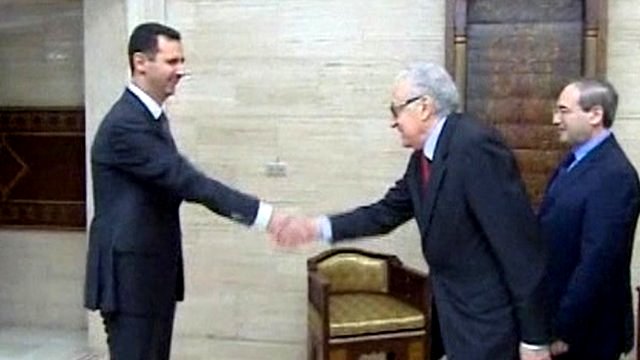LATEST: US Says Assad Has 45 Chemical Weapons Site, Not 23 Cited by Inspectors
Jump to Latest Update
SUMMARY: President Assad has used a meeting with United Nations envoy Lakhdar Brahimi to set conditions for the regime’s participation in an international conference in Geneva.
Assad told Brahimi on Wednesday in Damascus that “foreign intervention” for the Syrian opposition and insurgency must be halted before the conference can be held: “Putting an end to support for the terrorists and pressuring the states that support them is the most important step to prepare… for dialogue….The success of any political solution is linked to putting an end to support funnelled to terrorist groups.”
The President continued, “The Syrian people are the only ones who have the right to decide on Syria’s future, and any solution or agreement must have the acceptance of the Syrian people, and reflect their desires.”
Brahimi’s meeting with Assad was his first since December 2012. It follows the envoy’s discussions with the Friends of Syria group, which has backed the opposition, and with Syria’s ally Iran.
The US and Russia proposed the Geneva conference in April but it has been repeatedly delayed amid the opposition’s insistence that Assad commit to giving up power. Washington and Moscow, after their agreement to obtain the handover of Syria’s chemical weapons stocks, have made a renewed effort in the last six weeks for the meeting.
Latest Updates, Most Recent First
US Says Assad Has 45 Chemical Weapons Site, Not 23 Cited by Inspectors
An interesting detail from Thursday’s hearing on Syria at the US Senate Foreign Relations Committee….
Assistant Secretary of State Thomas Countryman said that, according to US assessments, the Syrian regime has 45 chemical weapons sites.
The Organization for the Prohibition of Chemical Weapons, citing Syrian compliance with a timetable for the handover and destruction of its stocks, said Damascus has only 23 sites with 41 chemical weapons facilities.
Countryman said that the discrepancy would have to be resolved.
Senior US Official Ford to Congress: US Strategy Based on “Neither Regime Nor Opposition Can Throw Knockout Punch”
Robert Ford, the former US Ambassador to Syria, has been in Ankara over the past week, trying to convince both regime and opposition figures to attend a “peace” conference in Geneva.
On Thursday, Ford testified before the Senate Commitee on Foreign Relations and offered telling comments about Administration policy:
The moderate opposition we are supporting is fighting on two fronts: both against the regime and against militants/extremists linked to Al Qaeda in Iraq — the same Al Qaeda in Iraq we used to fight….
Neither the regime nor the various opposition factions can throw a knockout punch in the foreseeable future, and our strategy is based on that assessment.
Ford, pushing the proposed Geneva conference, insisted that “most Syrians backing the regime and backing the opposition” support the initiative — even though key opposition groups have said they will not attend without an assurance that President Assad will leave power, and even though Assad has said that “foreign intervention” must first stop.
The Ambassador called on the opposition not only to say what they reject — Assad in power — but what they support “as an alternative”: “The opposition has a lot of work to do in that regard.”
Challenged by Senator Robert Menendez, “I just don’t get a sense that we have a strategy,” Ford replied:
It’s a two-track strategy. First, keep pushing to get the two sides to the table. But we understand that the Assad regime is a tough, brutal regime…so we will have to have pressure on the regime to get them to make concessions.
Ford’s subsequent, long explanation of “pressure”? Meeting of the “Friends of Syria” core group and “help the moderate opposition to press for concessions from the regime when it gets [to Geneva]”.
Ford then said, “The other source of pressure will be the Russians.”
Chemical Weapons Inspectors Say Syria Has Destroyed All Facilities
The Organization for the Prohibition of Chemical Weapons said on Thursday that “the functional destruction” of all of Syria’s chemical weapons production and mixing facilities declared to inspectors has been completed, “rendering them inoperable”.
The OPCW said its team had visited 21 of the 23 declared chemical sites. Equipment from two sites, too hazardous to visit because of Syria’s war, was moved to other locations visited by inspectors.
The organization declared, “The joint mission is now satisfied that it has verified — and seen destroyed — all of Syria’s declared critical production and mixing/filling equipment. Given the progress, no further inspection activities are currently planned.”
The deadline for the destruction of the facilities was November 1. The OPCW timetable envisages the handover and destruction of all chemical weapons stocks by mid-2014.
Polish Journalist Back Home After Escape from Captors
Polish photojournalist Marcin Suder, kidnapped in Syria in July, has escaped his captors and is back home, according to Poland’s Foreign Ministry.
“He was very lucky, he managed to escape,” spokesperson Marcin Wojciechowski said.
Suder, who worked for the Corbis agency and other outlets, was abducted by masked gunmen on July 24 during a raid on a media center in Saraqeb in Idlib Province in northwestern Syria.
No reason was given for his kidnapping and no one had publicly claimed responsibility for the abduction.
Casualties
The Local Coordination Committees claim 59 people were killed on Wednesday, including 18 in Damascus and its suburbs and 13 in Aleppo Province.
The Violations Documentation Center records that 77,194 people have been killed since the start of the conflict in March 2011, an increase of 173 since Wednesday. Of the dead, 57,404 are civilians, a rise of 160 from yesterday.

